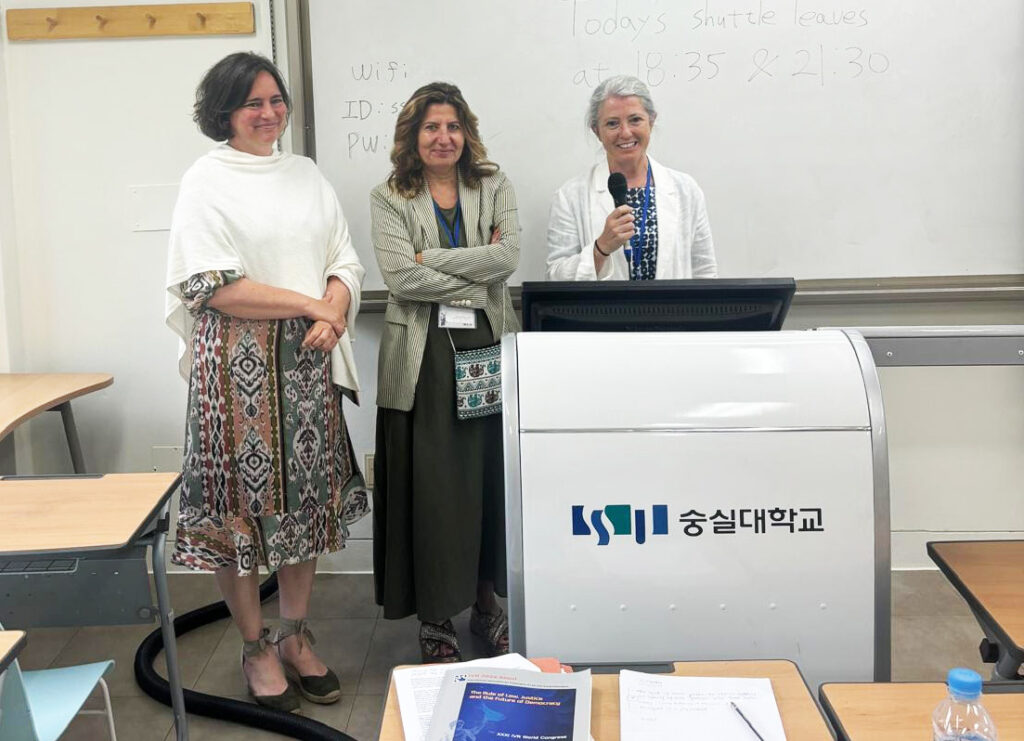
During the week of 7-12 July 2024, the biennial IVR Congress entitled “The Rule of
Law, Justice and the Future of Democracy” was held at Soongsil University in Seoul.
As part of this event, on the initiative of Professors Isabel Trujillo, Amalia Amaya
and Lucia Corso, a Special Workshop entitled “Virtues and Vices for the Rule of
Law” was organised. In addition to involving authoritative experts in the field, the
workshop made it possible to present the first results of the research conducted within
the PRIN project entitled “The Virtues of the Rule of Law as an Institutional Ethos”,
which involves the Universities of Palermo, Enna and Bari.
The workshop aimed to investigate the subjective side of the Rule of Law, paying
particular attention to the characteristics and abilities of human agents that can
strengthen the Rule of Law, as well as the vices that can weaken or even strengthen it.
Within this framework, skills, virtues and vices are understood in a broad sense as
moral and immoral habits, abilities or character traits of moral agents. The focus has
not only been on professional actors, but also on the so-called ‘laymen’. The
inspiration for the various contributions was drawn from the classics, current studies
and empirical research.
The workshop aimed to address, among others, the following questions:
1) Is the subjective aspect of Rule of Law relevant or not, and why?
2) What virtues are necessary for a rule system to function properly?
3) What vices, if any, can be tolerated or even encouraged?
4) What can the classical thinkers teach us about the subjective side of the Rule of
Law?
5) In what sense can moderation, temperance, hypocrisy be helpful to the Rule of
Law?
6) What other virtues can be useful and for whom? Legal practitioners (lawyers,
judges, civil servants)/the common people/citizens/government?
7) Can Rule of Law be separated from a more general attitude towards virtues and
vices?
The workshop covered the afternoons of Tuesday 9 July and Thursday 18 July, and
the presentations were as follows:
- Martin Krygier, “Well-Tempered Power: A Cultural Achievement of Universal
Significance” - Iris van Domselaar, “Large-Scale Miscarriages of Justice: Lessons from and for
Virtue Theory” - Gerald Postema, “Fidelity: The Animating Spirit of the Rule of Law”
- Mortimer Sellers, “Rule of law, Virtue, and Good Faith”
- Fabio Macione, “The Rule of Law in the Workplace: Artificial Intelligence and
its Impact on Human Confidence” - Sergiy Maksymov, “Fundamentals of the Rule of Law in the Ukrainian
Context” - Giovanni Bombelli, “Rule of Law and the ‘Cognitive’ (ethical) Jurist: Remarks
between Modernity and Post-modernity” - Isabel Trujillo, “The Legal Virtue of Reflexivity”
- Silvia Corradi, “Judges and Virtues: Rethinking phronesis for the Rule of Law”
- Cosimo Nicolini, “The Juridical Virtue of Moderation and the Ethical
Obligation beyond the Limits of the Law: Some Questions through
Maimonides and Levinas” - Antonia Scaravilli, “Rule of law and the Crisis of Representative Democracies:
The Role of Judges and the Possible Definition of a Deontology of Judicial
Action, Shared in a Supranational Dimension, as a Safeguard for the Defense
of the Constitutional State” - Tomasz Widlak, “The Relevance of Judicial Virtues for the Rule of Law”
- Liesbeth Huppes-Cluysenaer, “Ethical Legal Practice in Ancient Athens”
- Luis Pereira, “The Discipline of Legality: a Defence of Kelsenian Neutrality”
The presentations were a fruitful opportunity to engage participants in discussions
related to the subject matter of the workshop: in addition to strengthening the network
of scholars interested in Rule of Law from a virtue ethics perspective, the meeting
allowed for international exchange on these topics, thus enhancing the research
conducted in the PRIN project.
No responses yet